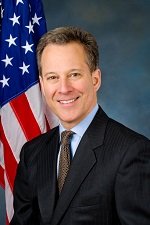Turing Pharmaceuticals faces a new adversary: New York's attorney general. AG Eric Schneiderman's office has launched an antitrust investigation into Turing, the drugmaker whose 5000% price hike put the pharma industry's pricing policies under a microscope.
 |
| New York Attorney General Eric Schneiderman |
As The New York Times reports, the AG's office isn't as interested in the price increase as in the tactics Turing might have used to protect its monopoly pricing power. Daraprim, the drug that's drawn so much attention to Turing, is a 62-year-old, off-patent product that faces no cheap generic rivals.
"While competition might ordinarily be expected to deter such a massive price increase, it appears that Turing may have taken steps to prevent that competition from arising," the AG's antitrust chief, Eric Stock, said in a letter addressed to Turing CEO Martin Shkreli (as quoted by the Times).
Since Turing's enormous price increase on Daraprim went public, analysts have suggested that sales of the drug, used to treat toxoplasmosis, had been too small to inspire a generics maker to develop its own version. But that was when it cost $13.50 per tablet. At Turing's new $750-per-pill list price, the calculus would be different. Word was that Turing's tight distribution network could prevent generics makers from obtaining the Daraprim supplies they would need to develop a knockoff version.
The Times now reports that Daraprim is no longer available from the usual drug wholesalers or from retail drugstores. It's distributed to patients via Walgreens' specialty pharmacy, the newspaper says, and hospitals use a special phone number to place orders.
And as the Times notes, Shkreli has previously used restricted distribution to keep generics companies from obtaining supplies of other branded meds.
Turing is far from the only company that has used this tactic, so this is another example of how the Daraprim price hike has shone new light--sometimes unwelcome--on pricing practices and market protections often used in the pharma business. In addition to the New York AG's investigation, Sen. Amy Klobuchar last week urged FTC Commissioner Edith Ramirez to dig into drugmakers' use of distribution limits to thwart generics makers.
Over the past few years, some drugmakers have taken advantage of limited-access distribution programs, mandated by the FDA for safety reasons, to refuse would-be copycats access to supplies of their branded drugs. For instance, generics makers Apotex and Roxane Laboratories sued Actelion ($ATLN) for refusing to hand over supplies of its drug Tracleer, a legal bid that eventually attracted backing from the Federal Trade Commission.
Generics maker Lannett ($LCI) settled a similar lawsuit with Celgene ($CELG), which had withheld samples of its blood-cancer drug Thalomid. More recently, the FTC filed a brief supporting generics maker Mylan ($MYL) in a fight for access to Celgene's Revlimid.
And now, of course, there's a potential legal fight over Turing's Daraprim distribution; Klobuchar cited the Daraprim case in her letter to the FTC last week. "Some companies may be combining a substantial price increase for a prescription medication with a closed distribution system," Klobuchar wrote. "If the restricted distribution prevents or delays generic competition, it could subject consumers to unnecessarily high prescription drug prices. We urge you to investigate whether companies are using restricted distribution in a manner that violates the Federal Trade Commission Act."
Bernstein analyst Ronny Gal cited Ramirez's response in an investor note. The FTC commissioner told a congressional committee last week that it's a "top priority" for the agency to address the use of specialty pharmacy channel restrictions to prevent generics makers from getting samples needed for trials.
- read the NYT story
- see the statement from Klobuchar
Special Reports: 10 big brands keep pumping out big bucks, with a little help from price hikes | The top 10 most expensive drugs of 2013